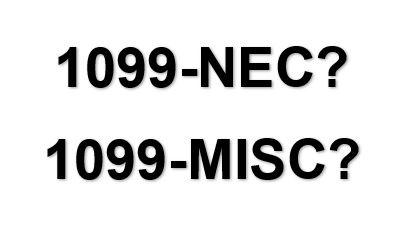
For Tax Year 2020 (i.e. for tax forms you’ll file in 2021) what used to be on one form, the Form 1099-MISC, is now split between a slimmed down 1099-MISC and a “new” 1099-NEC. I say “new” because it last existed in 1982, so it is new to most of us.
Before getting into what you must report on each, let us first go over what DOESN’T get reported on either of the two forms:
• Payments to a corporation (C or S) or an LLC treated as a corporation (there’s an important exception regarding lawyers);
• Payments for merchandise, telegrams, telephone, freight, storage, and similar items,
• Rents paid to an agent or property manager (the agent or manager must report on 1099-MISC payments to the property owner);
• Employee wages;
• Group term-life insurance costs;
• Military differential wage payments;
• Business travel allowances;
• Payments made through a third-party network transaction (credit cards and other payment processors);
• And a few specialty cases.
What is this Form 1099-NEC?
Way back in 2015, Congress passed an act they called the Protecting Americans from Tax Hikes (PATH) Act which resurrected the Form 1099-NEC for reporting Non-Employee Compensation (see, “NEC”). If you run a trade or business (nonprofits and some special cases are included as well), what you reported on Line 7 of the 1099-MISC last year now has its own full form. Your deadline for the 1099-NEC is February 1, 2021.
In general, you will report on Form 1099-NEC any amounts in excess of $600 for: services performed by someone not your employee, payments to an attorney, or (yes, I’m serious here) cash purchases for fish from a fishmonger.
The most common items to report on your Form 1099-NEC include:
• Service fees and payments to independent contractors (examples include consultants, plumbers, bookkeepers, graphic designers, etc. who are not your employees);
• Fee-splitting or referral fees;
• Non-employee commissions;
• Payments to entertainers;
• Exchanges of services (yes, “barter” arrangements for services are captured here).
A very special case is that Attorney’s Fees paid in cash over $600 are reportable on your 1099-NEC even if paid to a corporate entity.
What about the old 1099-MISC?
Now, your old friend the 1099-MISC is still around with a fresh new slimmed-down look. You will need to file that by March 1, 2021, if you are filing on paper or March 31, 2021, if filing electronically.
The most common items you will report on your Form 1099-MISC include:
• Royalty payment in excess of $10;
• Rents paid to a property owner;
• Prizes and awards;
• Amounts of federal income tax under backup withholding rules (even if the person in question is not an employee);
• And some special cases, including deceased employee wages, payments made on behalf of another person, state or local sales taxes imposed on the seller of services but paid by you, fishing boat proceeds, payments in lieu of dividends or interest, crop insurance proceeds, and nonqualified deferred compensation.
• There is a “check the box” requirement if you made sales of $5,000 or more to a person on a buy-sell/deposit-commission/or other commission basis anywhere outside an established store (network marketers: take note).
And of course, payments to an attorney make an appearance for special treatment here: gross proceeds in excess of $600; that are paid in connection with legal services but not FOR the attorney’s services (for example an amount paid to a law firm as part of a settlement agreement); and are otherwise not reportable on the 1099 NEC are reportable on the 1099-MISC.
Another special case are payments of $600 or more to a physician or other provider of medical/healthcare services in the course of your trade or business, including corporations. But note the key words and ask yourself: Was this “in the course of my business” and not incidental?
Some questions to ask when determining if you need to file either of the 1099s:
First, ask yourself: Is this payment to a living employee? If yes, then more likely than not, you’ll not report it on these forms. If you work through the W-2s you’ve filed and find there’s some payment to an individual that doesn’t belong there, then you might need to revisit the 1099s.
Second: Did you pay by credit card? Then you can move on.
Third: Was this payment in the course of operation of my trade or business? Personal payments are not reported here.
Fourth: Did you pay a lot of cash out in any way related to purchasing fish or hiring attorneys?
Fifth: Anything else a bit weird?
Those five questions will likely sort out most of your concerns and lead you to the right form. But as always, consult your tax preparer or tax attorney for specific questions or issues.
